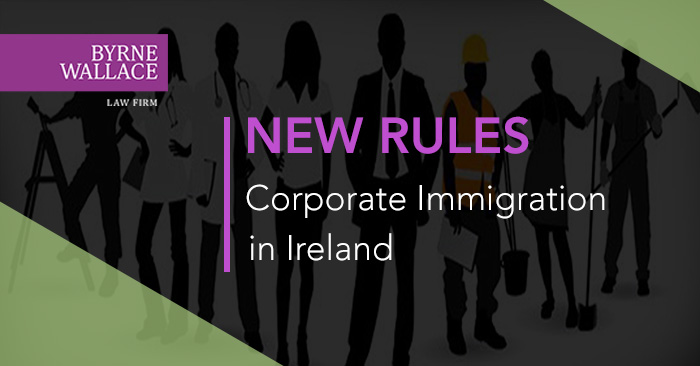Recent changes to immigration law help to address skills shortages across certain Irish industry sectors
Thursday, 25 April 2019
There have been three recent developments in the area of corporate immigration which will improve access for foreign workers to the Irish labour market. These developments, which are outlined below, include changes to the list of occupations deemed as critical to the Irish economy and will help to address skills shortages in certain industry sectors, including construction and sports.
1. New employment permit regulations
New employment permit regulations came into force on Monday, 22 April. Amongst other changes, the regulations will ease restrictions on non-EEA nationals with construction qualifications seeking to be employed in Ireland and make changes as part of the Government's Brexit preparations. The regulations re-classify certain occupations as highly skilled, and others will be de-classified as ineligible, for the purposes of employment permit applications:
(a) Highly Skilled Occupations List
The Critical Skills Employment Permit (CSEP) may be granted to non-EEA nationals who possess a skill or qualification which is deemed to be critically important to growing Ireland’s economy and in respect of which there is a significant shortage of supply in the Irish labour market.
In order to qualify for a CSEP, an applicant must either be paid a minimum annual remuneration of €60,000 or, where the occupation is on the Highly Skilled Eligible Occupations List, a minimum annual remuneration of €30,000.
In recognition of the shortage of home grown talent in the Irish construction industry, the following occupations have been added to the Highly Skilled Eligible Occupations List: Civil Engineers; Quantity Surveyors; Construction Project Managers; and Mechanical and Electrical Engineers with BIM expertise.
In the area of sports, High Performance Directors and Coaches in roles involving national or high profile sports organisations engaging in international competition have also now been added to that the Highly Skilled Eligible Occupations List.
(b) Ineligible List of Occupations
Where an applicant does not qualify for a CSEP, and the occupation is not on the Ineligible List of Occupations, a General Employment Permit (GEP) may be considered. The new regulations confirm that a number of trade and semi-skilled occupations will be removed from the Ineligible List of Occupations, making the GEP an option for those roles, subject to a quota of 250 in respect of certain occupations. The occupations removed from that list include sheet metal workers, welding trades, pipefitters, scaffolders, stagers, riggers, crane drivers, plasterers and bricklayers.
The Brexit-related changes involve Transport and Distribution Clerks and Assistants being removed from the Ineligible List of Occupations, subject to a quota of 300.
2. Spouses and partners of CSEP holders
Last month, the Government announced that spouses and partners of CSEP holders will now be able to access the Irish labour market without the need to obtain an employment permit. Previously, the spouses and partners of CSEP holders were required to apply for their own employment permit before commencing work in Ireland. It is expected that this change should make relocating to Ireland more enticing for highly skilled workers.
3. Re-entry visas
The Government has also announced that from 13 May 2019 visa required nationals who hold a valid Irish Residence Permit (IRP) card (formally a GNIB card) will no longer be required to apply for a re-entry visa to travel back into the State should they leave at any time. Visa required nationals who do not hold an IRP card, those under the age of 16, or individuals who have applied for and have not been issued with an IRP card, will continue to require a valid re-entry visa.
For further advice and information on the above, or any applications for employment permits, contact Emmet Whelan, or your usual ByrneWallace contact.
Alternatively, visit our the ByrneWallace Corporate Immigration page for details of our services and expertise advising companies on immigration matters.

